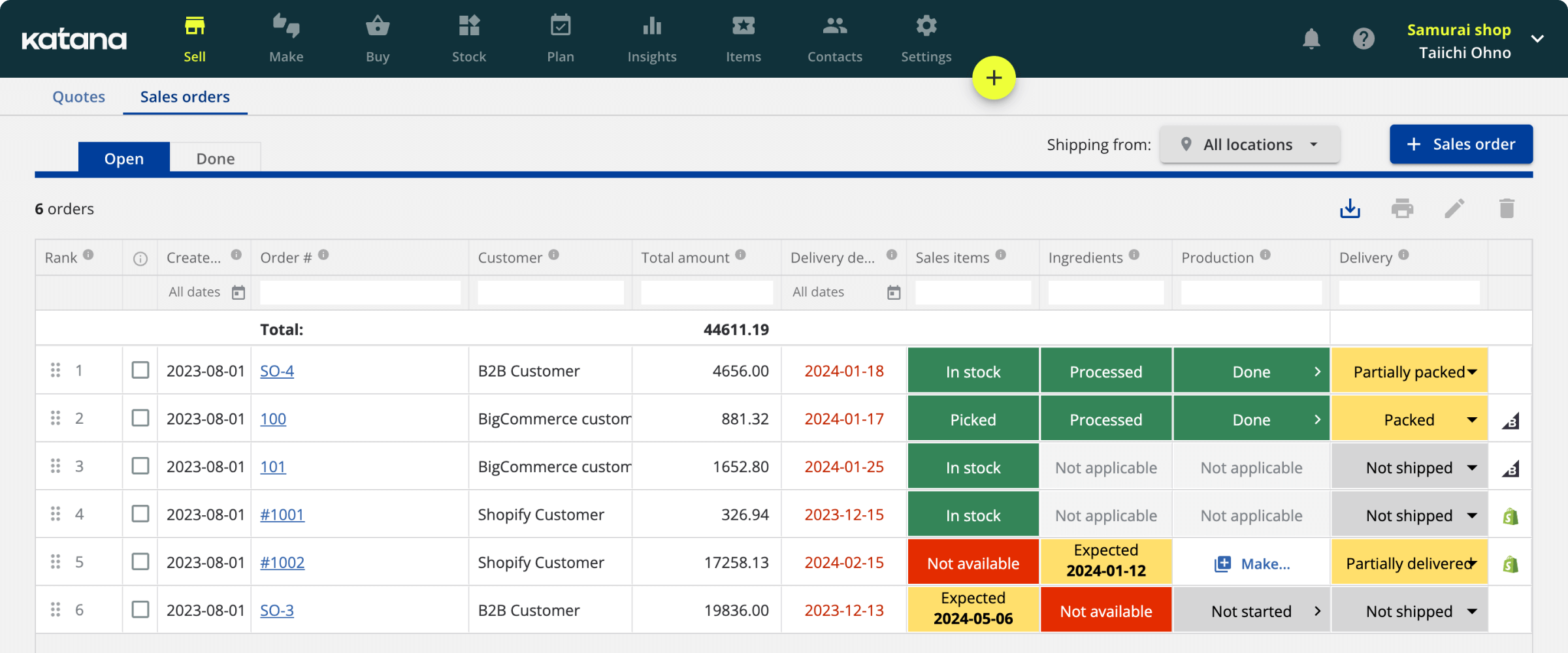How to Dominate the Market with D2C Manufacturing
DTC or D2C manufacturing is becoming the main choice of business model among manufacturers. Discover direct to consumer manufacturing and how to work it.
Team Katana

D2C manufacturing has quickly become the preferred choice of selling for manufacturers, as it allows them to get more control over their business and have more interaction with their consumers. So, if you want your business to transition to this model, be sure to read on to the end.
“Back in our day, the only way we could get our products in front of consumers was by partnering up with a retailer and meeting all of their requirements to get on their store shelves!” you may hear an older manufacturer cry out.
“But you youngsters, you whippersnappers have it easy!” they might also add.
And if you did hear someone complaining about this in the manufacturing industry, they’d be mostly right!
This is because many modern forward-thinking manufacturers have decided to completely cut out the retailers, wholesalers, and middlemen to form a direct to consumer (DTC) manufacturing business instead.
Direct to consumer manufacturing is where the manufacturer sells its products straight to the customer, as opposed to selling via a middleman.
And it’s a tactic which is only growing in popularity, not just for manufacturers, but for customers too who want to know more about how and where their products were manufactured.
That’s why we’ve put together this article exploring what is direct to consumer manufacturing and how someone can make this model work for their business.
So, without further ado, let’s delve straight in!
What is Direct to Consumer (DTC)?
DTC meaning Direct to consumer (or D2C) means that you’re selling your products directly to your customers, without the assistance of third-party retailers, wholesalers, or any other type of middleman.
The reason the D2C business model has become a growing trend for manufacturers either creating products in-house or via outsource manufacturing is because customers are more and more transitioning to online shopping instead of the traditional route of going to a physical location to buy their products.
But, not only is this the ideal selling tactic for manufacturers trying to stay ahead of future manufacturing trends and predictions, becoming a direct to consumer brand allows manufacturers to sell their products at a lower cost than other traditionalist manufacturing brands, and to take complete control of their business, from production to marketing and even the distribution of their products.
In the days of yore, when manufacturers would either sell their goods to retailers or agree to have inventory on consignment, the manufacturer was at the mercy of how much effort their partner put into selling their inventory.
But nowadays? The modern D2C manufacturer is a free spirit!
They can still enter these traditional business agreements, but now they can establish their own D2C e-commerce store, get set-up on different (but relevant) marketplaces, and even get involved with some offline activities such as pop-up shops or attending trade fairs to increase their company’s awareness.
To get into the mindset of someone using a direct to consumer manufacturing model, you need to remember your objective isn’t to go toe-to-toe with the larger manufacturing companies but to rethink the entire retail model to get ahead of your competitors.
PRO TIP: Intimidated about jumping into this? Taking a DTC approach, even as a start-up company, is a great way to raise your brand’s awareness. However, be sure to optimize your small business inventory management to support this strategy.
Why Are Businesses Turning to Direct to Consumer Manufacturing?

In the world of commerce, omnichannel retailing is becoming the go-to tactic when trading online and offline.
The omnichannel approach to selling is having an integrated experience, where consumers can view and purchase your products across several channels, and regardless of where they are, have a smooth shopping experience when visiting and navigating between your channels.
So basically, if a customer makes a purchase through your online store, but unfortunately isn’t happy with the purchase, they can easily arrange a return through a different channel such as your business’s Facebook page.
As you can imagine, this is an extremely convenient way of shopping for your customers.
And this D2C omnichannel approach hurts manufacturers who sell their products via a middleman since they’re unable to compete with this type of service.
This is probably one of the biggest factors as to why many manufacturers are choosing to transition to a D2C model because ultimately if you’re selling through a third-party retailer, you must rely on their marketing strategies and their enthusiasm to sell your product.
Yes, they’re a partner, and if they sell your product they obviously benefit. However, most retailers will more than likely stock your competitors’ products too.
The middleman is only concerned about making a sale. So, if a customer is leaning toward purchasing a competitor’s product, the retailer won’t try to sway them toward yours.
This alone is probably enough to understand why going D2C is a must.
But before we move onto the benefits, be sure to check out direct to consumer success stories to figure out how the other most profitable direct sales companies benefited from going D2C.
PRO TIP: One of the biggest challenges of running a direct to consumer manufacturing model is keeping on top of your inventory management. Be sure to stay ahead by keeping up with your raw material inventory.
What Are the Benefits of Manufacturers Going DTC?

Let’s go through a list of benefits that your business can experience if you decide to take the D2C approach to sell your products.
1. A better understanding of the consumer
It used to be that manufacturers would have hardly any interactions with the consumers who’re using their products. However, anyone selling to customers directly can now use market research and focus groups to get a better understanding of how their product is performing on the market.
D2C manufacturers have a direct channel of communication with consumers, a valuable resource for improving their business and products.
2. The fastest way to the marketplace
Going D2C means it’s not necessary to find a partner to sell your products anymore, which used to be an issue for a manufacturing start-up, as their product had no history to guarantee its success.
But now? Theoretically, you could open a WooCommerce store and have a channel to sell your product for, essentially, free. Just be sure to have your WooCommerce inventory management down to a T.
3. More control over your brand, product, and reputation
Traditionally, manufacturers only had control over their packaging and outbound marketing, and as soon as their products were in the clutches of the middleman, they could no longer influence a sale.
This is not the case for direct to consumer manufacturing, who can generate interest, provide an enjoyable shopping experience for a lead, and even completely personalize a customer’s visit.
4. The omnichannel approach
Finally, a D2C manufacturer can enjoy leveraging their brand’s presence online and off, by selling via their online storefront, physical location, through online marketplaces like Amazon, and even through social media.
Okay, we fibbed, we have a bonus benefit!
5. Receive a fair share of the demand that you’ve created
This is assuming that you take a D2C approach and sell via retailers too.
If you’re able to raise your brand’s awareness, and consumers go to the retailer, one of two things will happen if you’ve executed a strong marketing plan:
— The customer will be looking for a product and recognize your brand; or
— The customer will already be specifically looking for your brand.
We know what you’re thinking. This all sounds glorious!
But, before you rush off and try to use direct to consumer manufacturing for yourself, let’s look into how to be successful in direct sales first.
How to Be Successful in Sales as a DTC Manufacturer
Direct to consumer manufacturing is a gift… and a curse! But, let’s tone down the dramatic flair!
Yes, the D2C model puts the manufacturer in complete control of their business. But, that newfound freedom comes with the cost of having to manage every aspect of your business.
That’s why we’re going to give you the cornerstones that you’ll need to master to know what is direct to consumer manufacturing and how to make it work.
1. Marketing
Riding solo as a D2C manufacturer means you’re going to have to develop a marketing campaign to raise your brand’s awareness. But since you won’t be relying on any partners, you can concentrate on developing your brand’s voice and image, just like the infamous Dollar Shave Club:
But never mind that, the biggest benefit to being D2C is that you can get access to customer’s data, which is going to be invaluable when launching an email campaign, which will help you capture leads and convert them into a paying customer.
Better yet, there are tools out there, such as Constant Contact and Mail Chimp, which gives you the power of automation to help you better target your emails.
2. Quality over Quantity
You may want to show off your manufacturing prowess, but don’t!
Decidophobia is very real.
Try to provide your customers with a quality product as opposed to trying to cater to everyone. Otherwise, all your products will suffer, and you could drive away potential customers who don’t know what to pick.
Take, for example, Casper, a mattress manufacturer who discovered that shoppers found buying a mattress to be an “awful consumer experience.”
Mainly due to the huge selection to choose from and the prices. So, they distinguished themselves based on three principles:
— Showcasing one model of bed;
— At an affordable price;
and
— With home delivery.
3. Leverage Online Presence
An astonishing 87% of consumers begin their product searches on digital channels, with 28% of them starting on marketplaces like Amazon.
And a further 1.6 billion people use their mobile devices to shop online.
These figures are head spinning, but the perfect reason as to why your D2C business should be trading online. Don’t just stop at an e-commerce website, get yourself established on marketplaces, social media, and any other digital channel you can sell from.
The goal is when a consumer searches for a product, yours is what is offered across all these platforms and search engines.
4. Get Automated
Regardless of how well you pull off the former points, it’ll all be wasted resources if you don’t have the back end in place to support a scaling D2C manufacturing business.
That’s why it’s critical to find a piece of wholesale software that can support a manufacturing company by centralizing your entire business (that is your order fulfillment, production scheduling, and floor-level management, for example) onto one, easy to navigate dashboard.
Katana is an all-in-one solution for direct to consumer manufacturing which:
— Has a unique auto-booking engine
When a sales or manufacturing order is created, Katana automatically takes available finished goods and materials, and allocates them to the open orders, allowing you to immediately know if you’re able to start production or not.
— Helps you with raw material Management
Not only can you track finished goods, but Katana allows you to get real-time updates on raw material levels and set reorder points, so you know exactly what you have in stock and when you need to order more.
— Has integration features with other platforms
Anyone practicing direct to consumer manufacturing has an online storefront. Katana can integrate and synchronize with Shopify, WooCommerce, and other e-commerce channels, so you don’t need to switch between apps or constantly update accounts individually. FYI: It is also capable of integrating with accounting software such as QuickBooks too.
PRO TIP: Regardless of is you’re just on Shopify or running your business through QuickBooks, you’re going to need to optimize your Shopify inventory management and QuickBooks inventory management.
To see the power of the production planning feature yourself, request a demo today, so you can experience the full power of automation first-hand.
Conclusion

And there you have it! Everything you need to know about what is direct to consumer manufacturing and how you can make the most out of it.
Maybe you’re a big dreamer, and wonder which strategy best helps a famous brand company reach consumers?
Well, the D2C model still works for the larger corporations, even more so since they already have a reputable brand name behind them.
However, transitioning from any model to a D2C omnichannel one is tricky, and that’s why it’s essential that any business, big or small, finds and adopts the right tools that can help them achieve this.
And, as manufacturers, you should be searching for a tool that can help you achieve this selling method, while also having all the features that can help you run your manufacturing business.
But to reiterate, if you want to become a successful business with direct-to-consumer manufacturing, you need to focus on these four areas:
1. Marketing;
2. Product Quality;
3. Online Presence; and
4. Automation.
Most platforms, like Katana, offer demos so you can understand why manufacturing software is essential for scaling businesses.
What are you waiting for? Click the banner below and see for yourself!
Team Katana
Table of contents
Get inventory trends, news, and tips every month
Get visibility over your sales and stock
Wave goodbye to uncertainty by using Katana Cloud Inventory for total inventory control
